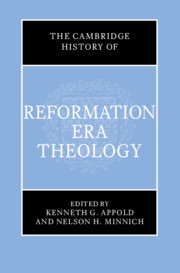Book contents
- The Cambridge History of Reformation-Era Theology
- The Cambridge History of Reformation-Era Theology
- Copyright page
- Contents
- Figures
- Acknowledgments
- Contributors
- Abbreviations
- Introduction
- Part One Theology in an Age of Cultural Transformation
- Part Two Schools and Emerging Cultures of Theology: Diversity and Conformity within Confessions
- Part Three Topics and Disciplines of Theology
- 21 Method and Ethos of Theological Instruction and Discourse
- 22 Biblical Theology
- 23 Systematic Theology
- 24 Controversial Theology
- 25 Sacramental and Liturgical Theology
- 26 Pastoral Theology and Preaching
- 27 Reformation Ethics and Moral Theology
- 28 Ecclesiastical Law in Early Modern Europe
- 29 Spirituality in the Reformation Era (1500–1675)
- 30 Catholic Christianity and Indigenous Religions in the Americas
- 31 Jesuit Catechisms in Japan and India
- 32 Theology in China ca. 1582–ca. 1688
- 33 Theology and Science
- 34 Theology and History
- 35 Theology, Politics, and Warfare
- 36 The Role of Art in the Theological Discourse of the Reformation
- Index
- References
25 - Sacramental and Liturgical Theology
from Part Three - Topics and Disciplines of Theology
Published online by Cambridge University Press: 27 September 2023
- The Cambridge History of Reformation-Era Theology
- The Cambridge History of Reformation-Era Theology
- Copyright page
- Contents
- Figures
- Acknowledgments
- Contributors
- Abbreviations
- Introduction
- Part One Theology in an Age of Cultural Transformation
- Part Two Schools and Emerging Cultures of Theology: Diversity and Conformity within Confessions
- Part Three Topics and Disciplines of Theology
- 21 Method and Ethos of Theological Instruction and Discourse
- 22 Biblical Theology
- 23 Systematic Theology
- 24 Controversial Theology
- 25 Sacramental and Liturgical Theology
- 26 Pastoral Theology and Preaching
- 27 Reformation Ethics and Moral Theology
- 28 Ecclesiastical Law in Early Modern Europe
- 29 Spirituality in the Reformation Era (1500–1675)
- 30 Catholic Christianity and Indigenous Religions in the Americas
- 31 Jesuit Catechisms in Japan and India
- 32 Theology in China ca. 1582–ca. 1688
- 33 Theology and Science
- 34 Theology and History
- 35 Theology, Politics, and Warfare
- 36 The Role of Art in the Theological Discourse of the Reformation
- Index
- References
Summary
“… that our dear Lord himself may speak to us through his holy Word and we respond to him through prayer and praise.”1 These famous words from Martin Luther’s sermon at the Dedication of the Castle Church in Torgau (1544) describe worship as a “word event” between God and human beings. For Luther the sacraments functioned as bodily words and analogously the proclamation of the word functioned in a sacramental way.2 Worship is the Sitz im Leben of theology or its point of reference; therefore, changes in theology manifest themselves in liturgy. Debates over the sacraments, their understanding, practice, and number were at the center of the debates among the Reformation movements and with the Roman church. There was a considerable variety of theologies and practices of sacraments and worship in the Reformation, though common structures can also be identified. In what follows, the central role of preaching in Reformation worship as a common feature will be highlighted first.
- Type
- Chapter
- Information
- The Cambridge History of Reformation Era Theology , pp. 511 - 531Publisher: Cambridge University PressPrint publication year: 2023



